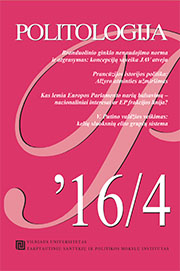Prancūzijos istorijos politika: alžyro atminties užmiršimas
Politics of history in France: forgetting the memory of Algeria
Author(s): Inesa UlichinaSubject(s): Military history, Political history, Politics and law, Cultural Anthropology / Ethnology, School education, Post-War period (1950 - 1989), Transformation Period (1990 - 2010)
Published by: Vilniaus universiteto leidykla & VU Tarptautinių santykių ir politikos mokslų institutas
Summary/Abstract: More than 130 years of shared history between France and Algeria followed by one of the most brutal wars of decolonization in 1962 generated important developments in both countries and their self-perceptions. However, immediately after the war, France began a policy of “national amnesia” towards the memories of Algeria. There is a “halo effect” that imputes an Algerian origin to any Arab-looking individual. Thus, since the biggest part of Arabs in France are of North African descent, in this research, Algeria is seen as a medium through which France perceives its Arab part of identity. The fact that the shared history with Algeria, memories and France’s wrongdoings during the war were not included in the national narrative of France had negatively influenced France’s ability to integrate its Arab population. The awareness of its own growing pluralism and inability to accept it has created an identity crisis. This article attempts to address this particular issue. For the purpose of illuminating how the repression of Algerian war memories in France’s governing myth influences France’s identity problems related with the acceptance of its Arab population, a theoretical approach of memory is employed. The article draws on research conducted by Duncan Bell, who is notable for revealing the possibility of the often overlooked contradictions between the collective memory and the governing myth of the nation. Bell claims that memories are inseparable from lived experience, while a myth is a constructed story that can encompass various events that were important for a particular community at any time in history. Bell finds that collective memories that are not integrated into the myth can act in opposition and challenge it. The article presents a case study of 2005 French law requiring school history teachers to emphasize the positive aspects of colonialism which illuminates the politics of history in France towards the Algerian war. Results of the analysis show that the politics of history pursued by the governing elite towards the memories of Algerian war remain the same despite the growing problems posed by a repression of the past. The second finding is that the strategy of adhering to the old myth, implying denial of the Muslim element in French identity flows, from the governing elite. The French state maintains the politics of amnesia towards the memories of Algerian decolonization and the war of independence despite the initiatives from the public. Such politics of history retain a denial of the Arab element in France’s selfunderstanding and continues to negatively influence France’s relationship with its Arab population. The repression of the Algerian memory fosters resentment among those who are forbidden their past and further deepen France’s identity crisis.
Journal: Politologija
- Issue Year: 2016
- Issue No: 4 (84)
- Page Range: 54-85
- Page Count: 32
- Language: Lithuanian

